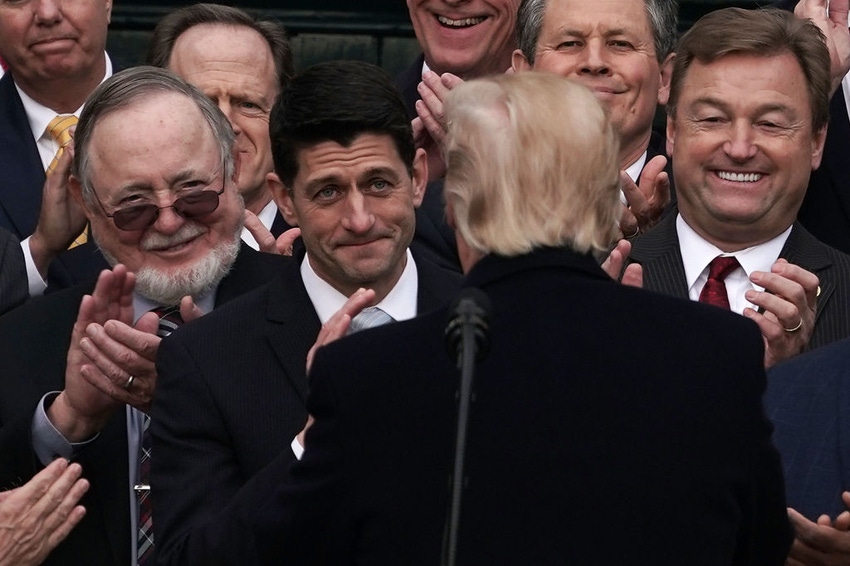December 22, 2017

The Tax Cuts and Jobs Act was passed this week. Below is a summary of the tax reform legislation, courtesy of the Equipment Dealers Association.
“The Tax Cuts and Jobs Act is a major win for dealers across the United States. EDA spearheaded the effort to obtain an amendment for floor plan financing for dealers and fought vigorously to ensure the preservation of LIFO,” said Rex Collins, partner with HBK.
The following changes will be effective for the 2018 tax year through 2025.
While the primary changes in this tax reform relate to corporate tax rates, there are significant changes to individual rates, as well. The legislation retained the seven-bracket tax structure, but widened the bracket widths.
Key Provisions Affecting Final Individual Taxable Income
Standard Deduction doubled to $12,000 for individuals or $24,000 for married couples.
SALT (State and Local Tax) Deduction limits the state and local tax deduction to a combined $10,000 for income, sales, and property taxes;
Home Mortgage Interest Deduction is maintained for one home up to $750,000;
Charitable Deduction is maintained.
Capital Gains rates are largely left unchanged.
Section 1031 Like-Kind Exchanges are maintained for real property transactions.
Retirement Savings Provisions around 401(k)s and IRAs are maintained.
Health Insurance
Individual Mandate is repealed beginning Jan. 1, 2019;
Medical Expense Deduction is maintained for expenses exceeding 7.5% of AGI in 2018, and 10% beginning in 2019;
Health Savings Accounts tax treatment is maintained.
Child Tax Credit is expanded to $2,000 per child (phase-out begins at $400,000 income).
Alternative Minimum Tax is retained on personal filings, but raises the exemption on the alternative minimum tax from $86,200 to $109,400 for married filers, and increases the phase-out threshold to $1 million.
Estate Tax relief is granted by doubling the exemption amounts ($11 million for individuals; $22 million for couples) through 2025; reverting to current amounts thereafter.
Stepped-up basis is maintained.
Business Income Tax Rates and Provisions
Corporate Rate permanently reduced to 21% beginning in 2018.
Pass-Through Businesses Income establishes a 20% deduction of qualified business income from certain pass-through businesses. Specific service industries, such as health, law, and professional services, are excluded. However, joint filers with income below $315,000 and other filers with income below $157,500 can claim the deduction fully on income from service industries. This provision expires Dec. 31, 2025.
Alternative Minimum Tax for corporations is eliminated.
Interest Deductibility
Small Business Exemption fully maintained for businesses with less than $25 million in revenue. Farming businesses with income greater than $25 million can retain interest deductibility if they use the Alternate Depreciation System for investments.
Limitation on Deductibility with Floor Plan Interest Amendment - Deduction limited to the sum of
(1) business interest income;
(2) 30% of the taxpayer’s adjusted taxable income for the tax year; and
(3) the taxpayer’s floor plan financing interest for the tax year. Any disallowed business interest deduction carried forward indefinitely (with certain restrictions for partnerships).
Definition of Floor Plan Financing Interest - Interest paid or accrued on indebtedness used to finance the acquisition of farm equipment held for sale or lease to retail customers and secured by the inventory so acquired. Does not include construction machinery and equipment.
Trade-Off for Using Floor Plan Interest
Full expensing disallowed if floor plan interest factored into deduction. Sec. 179 expensing still maintained if floor plan interest used.
Full Expensing allows full and immediate expensing of short-lived capital investments for five years.
Sec. 179 Expensing limits are increased to $1 million per year with phase-out beginning at $2.5 million, indexed for inflation after 2018.
Cost Recovery (Bonus Depreciation) is allowed for used property, and is permitted at the 100% rate through 2022, and phased down by 20% each year thereafter.
Net Operating Loss eliminates net operating loss carrybacks and limits carryforwards to 80% of taxable income. Farming businesses are still allowed a two-year NOL carryback.
Agricultural Cooperatives receive a 20% deduction on pass-through income that will be calculated on the gross income of the cooperative beginning in 2018 in lieu of the domestic production activities deduction (section 199), which is repealed.
Cash Accounting is maintained for farming businesses.
LIFO accounting method is maintained.
Repatriation enacts deemed repatriation of currently deferred foreign profits at a rate of 15.5% for cash and cash-equivalent profits and 8% for reinvested foreign earnings.
Territorial System eliminates worldwide system and moves to a territorial system with base erosion rules.
“EDA will continue to provide dealers with resources to understand the implications of the upcoming tax changes including an upcoming webinar in January. The summary contained in this press release is a nice overview but is not a substitute for tax advice,” added Kim Rominger, President and CEO of EDA.
Source: Equipment Dealers Association
You May Also Like




